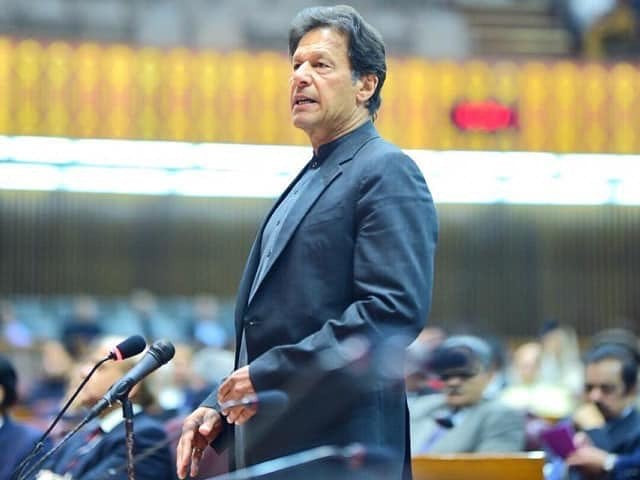A presidential system does not mean one person can wield unlimited power. Sorry to break this to those who have recently grasped on to the idea that a presidential system will somehow save Pakistan. If you want that kind of government structure, you’re looking for a dictatorship.
Most advocates of a presidential system in Pakistan are hoping for an unchecked executive being granted limitless powers. A person above the petty politics of Parliament, and who – through their iron resolve – will steer Pakistan out of the choppy waters it has found itself in and on towards the shores of prosperity.
Sounds like fantasy, doesn’t it? Well, that’s exactly what it is.
There is an obsession in Pakistan, a persistent hope, that a prophetic figure will swoop down at some point and singlehandedly solve all our problems. Perhaps it has something to do with the way our country came into being. A charismatic leader who, against all odds, carved out a nation for us. Pakistan’s population is frequently found dwelling over the question: what would Pakistan have looked like if Jinnah had lived longer? But dwelling on the past has never been a good recipe for fixing the problems of the present.
Advocates of a presidential system of government must first understand that Pakistan has already tried different iterations of this model. None of those models ever gave Pakistan the stability it has now achieved under a parliamentary model.
If there is one thing that our past has shown us, it is that Pakistan needs to stay far away from an over-centralised executive. Our past leaders under the presidential system have featured a rogue’s gallery of megalomaniacs who would stop at nothing to consolidate their power, be it through using religion or populism.
On the other hand, parliamentary democracy – the one that we now live in after the 18th Amendment – has given us two successful democratic transitions of power. If learning from history is anything to go by, our history shows that the presidential model didn’t work for us.
The people of Pakistan have never been shy about giving things a chance. They have voted and experimented with a kaleidoscope of political parties and systems. Now, on their third constitution, we’ve finally achieved a model that grants stability. All that model now asks of us is patience. Proponents of a presidential model lack that patience, but democracy of any form requires it. Dreams of ‘quick fixes’ do not turn the fortunes of a nation around.
The calls for a presidential system have been catalysed by the circumstances that the Pakistan Tehreek-e-Insaf (PTI) government has found itself in. The current position that the PTI has in Parliament is frustrating its leadership. With only a simple majority in Parliament, PTI’s belligerent attitude towards the opposition and inability to compromise has caused it to be unable to make any decent legislation in the last eight months.
So, it is not surprising that President Arif Alvi has stated in a media interview that the PTI is seriously considering a switch to a presidential system. This comes on the heels of the PTI also considering a roll back of the 18th Amendment.
Repealing the 18th Amendment was about consolidating power in the federation; the presidential system is about consolidating power in Imran Khan.
And that is how authoritarianism always begins, through the consolidation of power in one individual. Through the elimination of the checks and balances that parliamentary democracy brings. For a country that has spent half its existence under the rule of dictators, that is not the future we should aspire towards.
If PTI thinks that a strong presidential system will grant independence to Imran from the partisan nature of Parliament, it is mistaken.
First of all, such ideas show how little advocates for a presidential system understand about how it works. The United States is a presidential system – but that does not mean one man rules the country. If people believe that Donald Trump wields unlimited power, they need to stop consuming their news from social media and take a glance at the US Constitution – the document that constrains what the president can do.
The president of the United States is limited by the numbers in Congress, and it is Congress that passes law. Without support in Congress, there is not much that the president can achieve.
Parliamentary democracy or a presidential system can be equally messy in terms of politics. Only this year, the United States government was forced to shut down because of disagreements between Congress and the president over funding.
Thus, perhaps instead of dismantling the current parliamentary system we have worked so hard to build over the past decade, maybe we should try to identify its flaws and work towards improving them. The current system can be vastly improved through the strengthening of the local government system, for example. Similarly, the hold of dynastic politicians can be curbed by imposing term limits on the office of the prime minister.
Finally, one thing needs to be kept in mind before thinking about changing the entire system we have: the biggest adverse effect that a presidential system would have on Pakistan is that it would wipe out decades of work done to instil democratic values in our people. This is what has allowed some semblance of democracy to work in the land of the pure.
A presidential system will only ‘save’ Imran Khan, not Pakistan
A presidential system is about consolidating power in Imran Khan, and that is how authoritarianism always begins.

Prime Minister Imran Khan addressing a joint Parliament session on February 28, 2019. PHOTO: INSTAGRAM/ IMRAN KHAN PTI


COMMENTS
Comments are moderated and generally will be posted if they are on-topic and not abusive.
For more information, please see our Comments FAQ